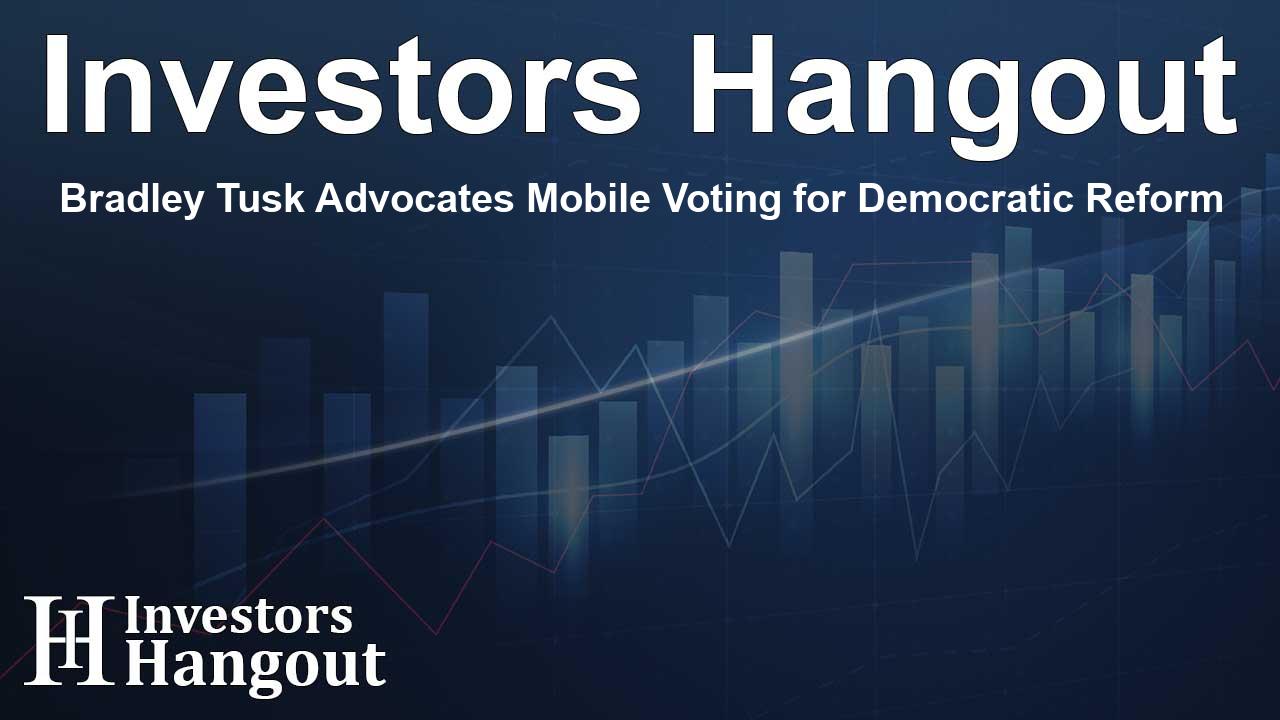Bradley Tusk Advocates Mobile Voting for Democratic Reform

Bradley Tusk Advocates for Mobile Voting as a Solution to Democracy's Challenges
In an urgent and insightful TED Talk, Bradley Tusk highlights the crucial need for mobile voting to enhance democratic participation in the United States. Tusk emphasizes that low voter turnout, especially in local elections, often leads to a government that does not represent the interests of the general populace. The solution, he argues, lies in enabling voters to cast their ballots easily from their mobile devices.
Understanding the Need for Accessibility in Voting
Tusk’s discussion sheds light on the disconnect between the electorate and the political system. He points out that political extremism thrives in an environment where voter participation is low. By facilitating mobile voting, we can engage more citizens, thereby ensuring that the voices of average Americans—who often hold moderate views—are heard and accounted for.
The Importance of Voter Inclusivity
During his talk, Tusk references various mobile voting pilot programs implemented in several U.S. states. These initiatives have been particularly beneficial for groups facing challenges at the polls, such as military personnel stationed abroad and individuals with disabilities. This approach not only simplifies the voting process but also empowers those who might otherwise be marginalized in the electoral process.
Innovative Technology on the Horizon
Furthermore, Tusk showcases an upcoming open-source, end-to-end encrypted mobile voting system developed by cybersecurity experts. This technology promises to enhance voting security, making it feasible for more jurisdictions to implement mobile voting without imposing additional costs on election officials.
Mobilizing Support for Mobile Voting
In a powerful closing statement, Tusk calls upon the audience to join forces in advocating for mobile voting. He reminds everyone that progress in civil rights and democratic participation often comes from collective action. The message is clear: to challenge the norms and foster a more inclusive electoral system, we must demand innovative solutions.
Voices in Support of Mobile Voting
Supporters echo Tusk’s sentiments, stating that mobile voting could be a game-changer in making democracy more accessible. Congressman Eric Swalwell notes that the feasibility of voting by phone has developed thanks to Tusk's visions and efforts.
Addressing Voter Suppression
As Martin Luther King III stated, the stakes are high. With ongoing voter suppression, it is crucial now more than ever to ensure that every citizen's voice is counted. Mobile voting enables safe, quick, and private participation in elections, addressing systemic inequalities.
Technical Advances Enabling Secure Voting
Industry experts point to significant advancements in cryptography and technology. Joe Kiniry, an expert in engineering and cybersecurity, advocates that modern secure mobile voting systems meet stringent standards previously deemed impossible.
Commitment to Voter Rights
Organizations such as Voto Latino are committed to ensuring that every eligible voter has the opportunity to participate without facing barriers. They view the upcoming mobile voting technology as crucial for improving access to the democratic process.
Through Tusk's TED Talk and the subsequent discussions, it is evident that the journey towards a more inclusive and participative democracy requires innovation and collective will. The call for mobile voting is not merely a technical change; it signifies a pivotal shift in re-establishing trust in the democratic process and ensuring representation for all citizens.
Frequently Asked Questions
What is the main focus of Bradley Tusk's TED Talk?
Bradley Tusk's TED Talk focuses on advocating for mobile voting as a solution to increase voter turnout and reduce political extremism in America.
How does mobile voting improve democratic participation?
Mobile voting makes the process more accessible, allowing groups like military personnel and individuals with disabilities to participate without facing barriers.
What technology is being developed for mobile voting?
An open-source, end-to-end encrypted mobile voting technology is being created by cybersecurity experts to ensure secure voting processes across various jurisdictions.
What are the challenges currently affecting voter turnout?
Low voter turnout results from systemic barriers, including political extremism, disenfranchisement, and lack of accessibility in the voting process.
Who supports mobile voting initiatives?
Various public figures, including Congressman Eric Swalwell and human rights advocate Martin Luther King III, have expressed support for mobile voting as a means to enhance democratic participation.
About The Author
Contact Thomas Cooper privately here. Or send an email with ATTN: Thomas Cooper as the subject to contact@investorshangout.com.
About Investors Hangout
Investors Hangout is a leading online stock forum for financial discussion and learning, offering a wide range of free tools and resources. It draws in traders of all levels, who exchange market knowledge, investigate trading tactics, and keep an eye on industry developments in real time. Featuring financial articles, stock message boards, quotes, charts, company profiles, and live news updates. Through cooperative learning and a wealth of informational resources, it helps users from novices creating their first portfolios to experts honing their techniques. Join Investors Hangout today: https://investorshangout.com/
The content of this article is based on factual, publicly available information and does not represent legal, financial, or investment advice. Investors Hangout does not offer financial advice, and the author is not a licensed financial advisor. Consult a qualified advisor before making any financial or investment decisions based on this article. This article should not be considered advice to purchase, sell, or hold any securities or other investments. If any of the material provided here is inaccurate, please contact us for corrections.
